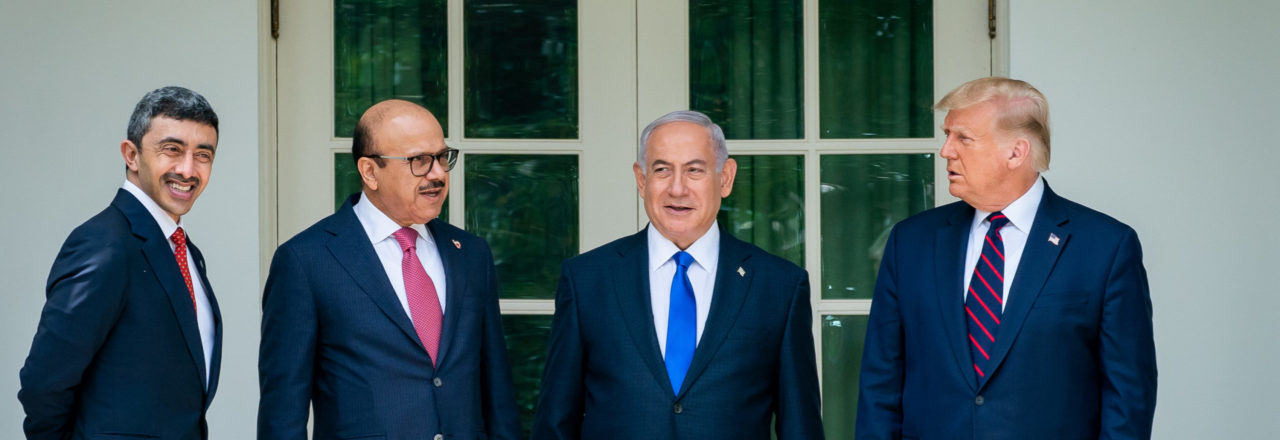On September 15, 2020, U.S. President Donald Trump hosted the leaders of Israel and Bahrain, as well as the Foreign Minister of the United Arab Emirates at the White House to sign normalization agreements, ending the UAE and Bahraini non-recognition of the Jewish State. To discuss the agreements, Aaron Stein, Director of Research at the Foreign Policy Research Institute, spoke with Michael Stephens, Senior Fellow at FPRI, about the implications of the normalization agreements and the Abraham Accords.
Aaron Stein: First off, thanks for doing this: I think the place to start is to just describe what happened a few days ago at the White House?
Michael Stephens: What happened was an important moment in the history of the Middle East. Let’s make no mistake, two Arab states normalizing relations with Israel is a big deal no matter what way you look at it. The reason that it hasn’t taken up pages and pages of our major newspapers is simply because neither the UAE, nor Bahrain (the states which signed the agreements) are really all that important when it comes to the history of the Israeli-Palestinian conflict. They don’t share borders with Israel, never fired at shot at Israel, and the Palestinian refugee populations that live in these countries are relatively small in number. So when it comes to “peacemaking,” there’s not much peace to make, and so it’s not a Begin and Sadat moment in 1979, or a King Hussain and Rabin moment in 1994. It is something quite different, and in a way, more interesting.
This normalization is based on concepts, it’s a peace built on shared views, understandings, and a belief in both UAE and Bahrain that you don’t have to reject Israel and its presence in the region to have sympathy for the cause of Palestine. In other words, it’s the first admission by an Arab State that the two issues can be separated, politically, but also emotionally. And that is a big moment because it formally begins a conversation across the region about Israel and its place in the region—a conversation which is not rejected out of hand due to a sense of offending Arab dignity because of the Palestinian question. It is a reflection also that the Arab world is fracturing; states are choosing their own pathways that suit their own interests and are rejecting larger Pan-Arabist or Pan-Islamic ideologies in favor of much narrower priorities.
In my view, it is the beginning of a wider acceptance of the Jewish State in the Middle East; it might take a few more decades before the entire region is on board, but that clock is now running.
Stein: Let’s dig a little deeper: You are perfectly positioned to discuss the motivations of each of the regional states. Can you go into detail about the UAE interests here, as well as Israeli and Bahraini motivations.
Stephens: For the UAE, the calculation is pretty simple: they lose very little from normalization. Mohammed bin Zayed is completely safe in his position as de facto ruler of the UAE—minor grumblings from locals on this issue are just that, minor. So, there’s no threat to him domestically. In terms of the UAE’s foreign position, well the region is pretty split anyway; Turkey and Qatar have formed an axis that is opposed to the UAE and its interests across the region. If President Erdogan gets upset at the UAE for normalization, it’s not like the UAE loses any ground here. There are 100 reasons why Ankara and Abu Dhabi don’t get on, and this is just another to add to that list. The UAE is a small country, but it is an effective military power, far more capable than any state around it. The Emiratis see Israel as really the only country in the region to aspire to in terms of technological proficiency and military effectiveness; and accordingly, they view Israel as a long-term partner for exchange of human capital and information and technical transfer that would benefit the UAE’s long term stability. As such, their relations with Israel have been growing for years, and this is really just an admission of what we already know to be true: that the two countries are friendly and see eye-to-eye on many issues, and not just the position of Iran and its influence in the region.
Minister of State Anwar Gargash has recently noted that the threat of annexation forced the UAE’s hand, speeding up normalization by approximately two years. I take that claim with a pinch of salt; I think what was more important was the need to do both Trump and Bibi a favor politically as both struggle in their unstable domestic political arenas. The Emiratis have not guaranteed that annexation of Palestinian land will never occur; they just delayed it. I don’t see this as much of an achievement on their part. What I see is the reflection of friendly relations that have been acknowledged at a time that is politically convenient for all three sides.
Bahrain is an interesting case. It is a tiny nation that is largely dependent on Saudi financial support for continued stability and has never properly regained its feet following large-scale unrest in 2011. People jokingly refer to Bahraini foreign policy as Saudi policy-by-retweet, which may be true for some regional issues, but not this one. Bahrain actually has quite a lot of flexibility to pursue its relations with Israel in a way that Saudi Arabia does not. Bahrain’s modern history includes a small Jewish population that has freely worshipped and has been recognized by the state, achieving great success financially and politically. Bahrain institutionally and in its identity as a state is comfortable with Judaism, in a way that (let’s be honest) some other states in the region really haven’t been. This already gives the Bahrainis a huge head start in terms of coming to terms emotionally and politically with normalization with Israel.
Bahrain’s domestic political space is much more open than in the UAE. This has led to a lot of unhappiness being expressed with the King’s decision to normalize relations, but ultimately it has not spilled out into larger unrest. And so, I think the King has calculated correctly that he can get away with normalization without too high of a cost. Like the UAE, Bahrain views Iran as an existential threat and has found shared cause with Israel. In terms of financial, security, and military benefits, Bahrain gains more from the deal than Israel does. So, I can see why it wasn’t too hard for them to agree to the deal. The Bahrainis also understood that Saudi Arabia would not stand in the way, which was probably the last piece of the jigsaw puzzle that needed to be fitted before they could say yes.
Stein: We have to talk about the Saudis: They aren’t ready to go as far as their regional ally, the UAE, but are more amenable to outward displays of quasi-recognition of Israel, beginning with the opening of airspace. Can you speak a bit about Saudi thinking here?
Stephens: Sure, the Saudis have played an interesting game. They’re not against what is happening, but they’ve been very careful to frame their support in terms of this being a step that is good for the Palestinians. Have you noticed that MbS hasn’t said a thing about this? It’s all been Foreign Minister Prince Faisal; it’s a smart move and shields the guy at the top from potential blowback if this deal is viewed negatively, or potentially of harm to Saudi interests.
There’s a basic fact that needs to be acknowledged, and, in fairness to Jared Kushner, he does seem to get it. The Saudis have responsibilities that far outweigh Bahrain and the UAE; they are the world’s preeminent Arab power, a G20 economy, and have played an extremely important role in the history of the Arab-Israeli conflict—just cast your mind back to the oil shocks of 1973. The Saudis view their position on Palestine through a political lens of self-interest—of course they do—but their self-interest stretches to being an Islamic leader, a bastion of Arab identity and culture, and it’s just not that easy to make peace with Israel while the Palestinians are under occupation. It’s really a step too far to suggest that Riyadh would give up its leverage on this issue without getting something equally important in return. A promise that annexation may not happen is simply not enough; the Saudis have been clear for many years that they want to see a Palestinian State and that Israel needs to reach an agreement with the Palestinians before they can themselves reach the stage where normalization of relations is possible.
Of course, Saudi is changing; many young Saudis are far more concerned with jobs, housing, the war in Yemen, and the enormous social changes that are taking place than they are with Palestine. MbS is part of that generation, and no doubt he doesn’t feel as committed or connected to the Palestinian cause as his father’s generation does. But that doesn’t mean you can just ignore it. Remember, MbS is still only the Crown Prince, he’s not the King, and being the King means being the Custodian of the Holy Places, and honoring the legacy of the Monarchs that have come before you. Sure, MbS can rip up the playbook on social issues, and he’s done a good job at that. But, this isn’t as simple as opening cinemas or allowing women to drive. The Palestinian issue cuts to the very heart of identity in the region, and Saudi monarchs have always taken their responsibility on this question very seriously.
Will Saudi normalize relations with Israel? Yes, at some stage in the future—who can say when—but that time definitely isn’t now. MbS may well feel that he has space to maneuver on this issue when he becomes King. I’m going to put my neck on the line and say this: I’ll give you 500 bucks if MbS does it within the first two years of him becoming King.
Make sure you hold me to that.
Stein: Oh for sure, that will pay for a lot of dinners and drinks once we can finally visit each other in the United States or the United Kingdom.

The views expressed in this article are those of the authors alone and do not necessarily reflect the position of the Foreign Policy Research Institute, a non-partisan organization that seeks to publish well-argued, policy-oriented articles on American foreign policy and national security priorities.


